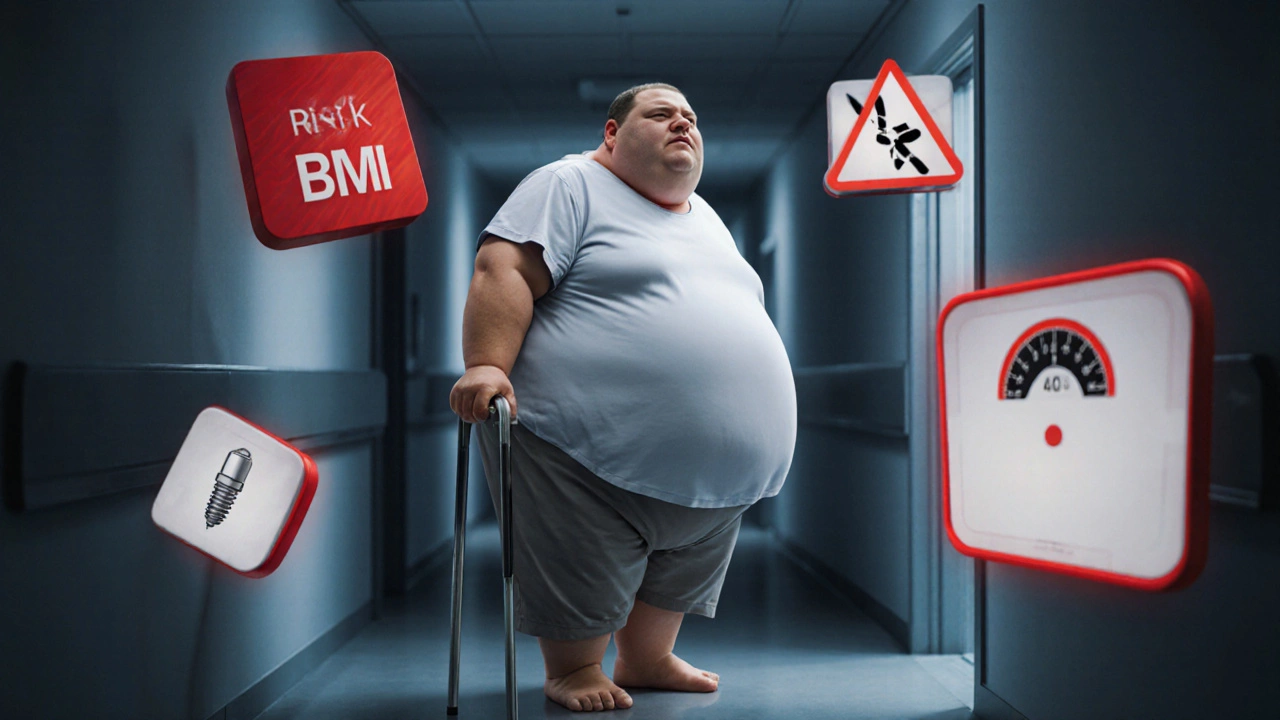Not everyone with knee pain needs a knee replacement. In fact, some people who think they’re ready for surgery might actually make things worse by going through with it. Knee replacement is a major operation - it’s not a quick fix for sore joints. If you’re considering it, you need to know who knee replacement isn’t right for. Skipping this step can lead to poor results, long recovery, or even more pain after surgery.
Severe Obesity Makes Surgery Riskier
Body weight matters more than most people realize. If your BMI is over 40, your chances of complications after knee replacement jump significantly. Studies show patients with severe obesity are 3 times more likely to develop infections, have blood clots, or need a second surgery within five years. The implant doesn’t just bear your weight - it bears extra stress with every step. A 250-pound person puts 750 pounds of force on their knee with each stride. That’s why doctors often ask you to lose weight before surgery. Even losing 10-15 pounds can improve healing and reduce pain long-term. If you’re not willing or able to manage your weight, the implant may wear out faster - or fail entirely.
Active Infections Are a Hard Stop
Any active infection in your body - whether it’s a skin sore, urinary tract infection, dental abscess, or even a lingering foot fungus - can spread to the new knee implant. Once bacteria settle on the metal or plastic parts, they form a biofilm that antibiotics can’t touch. This leads to a deep joint infection, which may require removing the implant, months of IV antibiotics, and multiple surgeries just to try again. Surgeons will delay knee replacement until every infection is fully cleared. That means treating a tooth abscess or a persistent foot rash before scheduling surgery. Don’t assume it’s ‘just a small infection.’ It’s not worth the risk.
Neurological Conditions That Affect Movement
Knee replacement doesn’t just replace cartilage - it relies on your muscles, nerves, and brain to work properly after surgery. If you have Parkinson’s disease, advanced diabetic neuropathy, or a spinal cord injury that limits your ability to control your leg, the new knee won’t help much. You won’t be able to bend it safely, stand up without help, or walk without falling. Physical therapy becomes nearly impossible. In these cases, the surgery might leave you more dependent than before. Doctors will often suggest non-surgical options like braces, injections, or mobility aids instead.
Very Poor Overall Health
If you have uncontrolled heart disease, severe lung disease like COPD, or kidney failure, going under general anesthesia is dangerous. Knee replacement isn’t a minor procedure - it takes 1-2 hours, and your body needs to handle the stress of surgery, blood loss, and recovery. People with poor heart function are at higher risk for heart attacks during or right after surgery. Those with severe lung issues may not get enough oxygen during recovery. Surgeons don’t just look at your knee - they look at your whole body. If your life expectancy is less than 5 years due to other illnesses, the risks of surgery usually outweigh the benefits.

Young, Highly Active Patients
It sounds strange, but if you’re under 50 and still running, hiking, or playing sports regularly, a knee replacement might not be the best choice. Implants last about 15-20 years, but high-impact activities wear them out faster. A 45-year-old tennis player might need a second replacement by age 60 - and revision surgeries are more complex, less successful, and come with higher risks. Younger patients are often better off with alternatives like arthroscopic cleaning, cartilage repair, or stem cell treatments. These won’t fix everything, but they delay the need for a full replacement. Waiting until your body really needs it gives you a better long-term outcome.
Psychological Readiness Matters Too
Surgery isn’t just physical - it’s mental. If you have untreated depression, anxiety, or unrealistic expectations, your recovery will suffer. Some people think knee replacement will make them feel like they did at 25. That’s not realistic. Others believe they won’t need physical therapy or that they can skip rehab. That’s dangerous. Studies show patients with depression have slower recovery, more pain after surgery, and higher rates of dissatisfaction. If you’re feeling hopeless or overwhelmed, talk to a counselor before scheduling surgery. Mental health isn’t a bonus - it’s part of the treatment plan.
Smokers and Vapers
Smoking isn’t just bad for your lungs - it kills your healing. Nicotine narrows blood vessels, reducing oxygen and nutrients to your surgical site. This means slower wound healing, higher infection rates, and a greater chance the bone won’t fuse properly to the implant. Vaping isn’t safer - it still delivers nicotine and toxins that interfere with recovery. Surgeons often require patients to quit smoking for at least 4-6 weeks before surgery. Some won’t operate at all if you’re still using tobacco. Quitting isn’t easy, but it’s the single most effective thing you can do to improve your outcome.

Previous Knee Surgeries or Scar Tissue
If you’ve had multiple knee surgeries before - like meniscus repairs, ligament reconstructions, or old arthroscopies - your joint may be too scarred for a successful replacement. Scar tissue can lock the knee in place, making it stiff even after the implant is placed. In these cases, the surgeon might not be able to get the knee to bend past 90 degrees, no matter how well the implant is positioned. X-rays and MRIs help spot this risk, but sometimes it’s only discovered during surgery. If you’ve had more than two prior knee procedures, your surgeon will likely recommend a thorough evaluation before deciding.
What If You’re a Bad Candidate? What Now?
Being told you’re not a good candidate doesn’t mean you’re stuck in pain. There are other ways to manage knee arthritis:
- Weight loss - even 5% of body weight reduces knee pain by up to 50%
- Physical therapy - strengthening quads and hamstrings can take pressure off the joint
- Braces - unloader braces shift weight away from the damaged side of the knee
- Injections - cortisone for short-term relief, hyaluronic acid for longer-lasting lubrication
- Low-impact exercise - swimming, cycling, or elliptical training keep you moving without pounding
- Pain management - nerve blocks or medications under a specialist’s care
Many people delay surgery for years and still do well. The goal isn’t to rush into an implant - it’s to protect your joint as long as possible and only replace it when you truly need it.
Frequently Asked Questions
Can I still get a knee replacement if I’m overweight but active?
It’s possible, but risky. Being active doesn’t cancel out the extra stress obesity puts on the implant. Most surgeons will recommend losing weight first - even if you’re fit. Losing 10-20 pounds can dramatically lower your chance of infection and implant failure. Some centers offer weight-loss programs before surgery to improve outcomes.
Is knee replacement ever done on someone under 40?
Yes, but rarely. It’s usually only done for people with severe arthritis from trauma, rheumatoid disease, or genetic conditions. Most surgeons avoid it because implants wear out, and younger patients are more likely to need revision surgery later. Alternatives like cartilage grafts or osteotomy are preferred when possible.
What if I have diabetes? Can I still have knee replacement?
Controlled diabetes isn’t a barrier - but uncontrolled diabetes is. High blood sugar slows healing and increases infection risk. Surgeons will check your HbA1c levels. If it’s above 8%, they’ll delay surgery until your levels are under 7% for at least 3 months. Good blood sugar control is non-negotiable.
Can I get a knee replacement if I’ve had a heart stent?
Yes, if your heart condition is stable. You’ll need clearance from your cardiologist. Most patients can safely stop blood thinners like aspirin or clopidogrel for a few days before surgery, then restart them after. The key is coordination between your heart doctor and orthopedic team.
What happens if I ignore the warning and go ahead anyway?
You risk serious complications: infection, implant failure, chronic pain, or needing more surgeries. Some patients end up worse off than before. One study found that patients who ignored weight-loss advice had a 40% higher chance of revision surgery within 5 years. Surgery isn’t a gamble - it’s a calculated decision.
Next Steps If You’re Unsure
If you’re wondering whether you’re a good candidate, start with an X-ray and a physical exam. Ask your doctor to explain your joint damage level - not just how much it hurts. Get a second opinion if you’re told you need surgery but feel uncertain. Talk to a physical therapist about strengthening exercises. Try a 3-month trial of non-surgical options before committing to surgery. Your knee is important - but your long-term health matters more.

 Understanding the Risks: Metformin's Impact on Diabetes Management
Understanding the Risks: Metformin's Impact on Diabetes Management
 Best Countries for Surgery in 2025: Costs, Safety, and How to Choose
Best Countries for Surgery in 2025: Costs, Safety, and How to Choose
 Understanding Knee Pain: When is Knee Replacement Necessary?
Understanding Knee Pain: When is Knee Replacement Necessary?
 How Long Are You Bedridden After Open-Heart Surgery?
How Long Are You Bedridden After Open-Heart Surgery?
 Understanding Cancer: The Types with the Lowest Survival Rates
Understanding Cancer: The Types with the Lowest Survival Rates